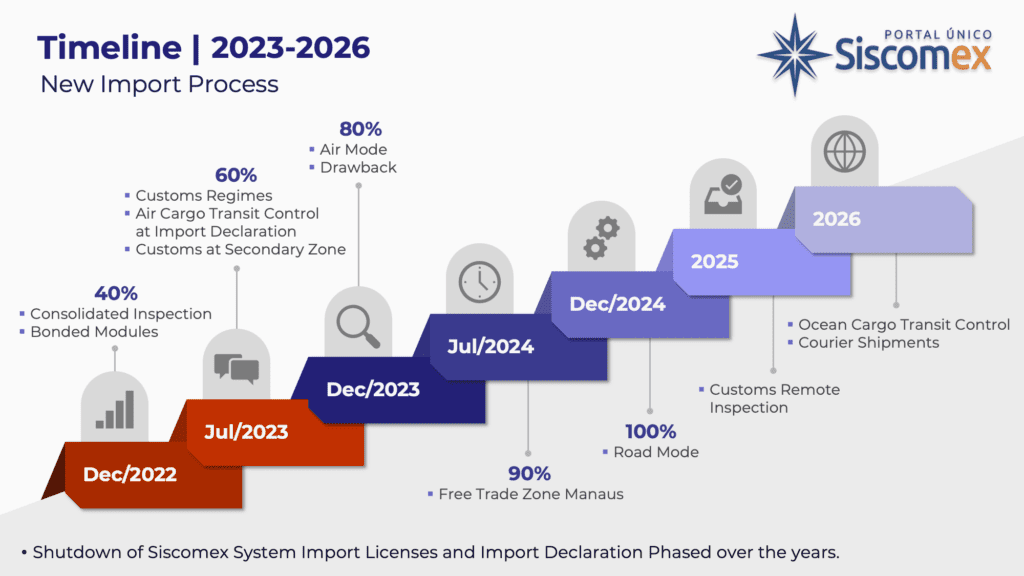In a significant move to streamline foreign trade operations, Brazil has introduced the DUIMP (Single Import Declaration), setting a new standard in the import process. This innovative approach is poised to replace the traditional DI (Import Declaration) and DSI (Simplified Import Declaration), marking a pivotal shift towards efficiency and integration.
At the heart of this transformation is the Product Catalog, a groundbreaking module seamlessly integrated into Siscomex, Brazil's own trade system. This article explores the essence of the Product Catalog, its operational mechanics, and the profound benefits it brings to Brazil's import landscape.
What is the Product Catalog?
The Product Catalog is a module of the Siscomex Single Portal. Through this module, all goods that a company sells are registered in a standardized and unique way.
This allows the data on registered goods to be used for each new import. The importer must simply identify the goods in the register and continue with the registration of the operation. It's important to note that the register is unique to each company and will also work across all its branches.
The Product Catalog is the database with all information relating to the goods sold and their operators, available on the Federal Revenue portal and not in the import company's system.
This eliminates the need to manually fill in information for each operation with the same merchandise, providing greater ease in subsequent operations and customs clearance.
How does the Product Catalog work?
When accessing the Siscomex Single Portal, you can access the “Product Catalog” Module. This module is used to register products with basic data, attributes, attachments, and history.
Currently, filling out information about goods is free for anyone who has access to the system. However, in the catalog, registration is done uniquely, before the goods enter the country of destination, and does not allow changes. If necessary, a new registration for the merchandise must be made, with the fields updated.
With this prior registration of goods, for each new operation, simply select the desired product in the catalog, and the system will automatically fill in all the related information.
There is also the possibility of attaching images and documents to the product registration, making the related information more complete and, therefore, easier to verify by inspections. After verification that the merchandise complies with the specifications in the catalog, the operation can continue.
Purpose and benefits of the Product Catalog
The Government's objective in implementing the DUIMP and its Product Catalog was to facilitate interaction between consenting bodies, speed up the nationalization of products, and make the import process more simplified.
Benefits of the DUIMP Product Catalog include:
- Reduction of the average time for import release by 40%.
- Decrease in time for filling out information.
- Reduction in the percentage of verification and inspection by the Federal Revenue.
- Information provided once on a single portal.
- Single licensing of goods covering all consenting bodies validated in the system.
- Integration of operations control procedures.
- Efficient sharing of information, respecting fiscal and commercial confidentiality.
The catalog is, therefore, a system change that aims to optimize the entire process related to foreign trade, reducing bureaucracy and even costs. It is expected that its implementation will reduce the estimated time for export operations from 13 to 8 days, and import operations from 17 to 10 days.
Implementation schedule

Source: www.gov.br
Tackling Brazil's Product Catalog Challenges
Introducing Brazil's Product Catalog has brought a fresh set of tasks for companies importing goods. Now, you have to make sure every product is listed correctly in the Siscomex portal, which requires a lot of detailed work. Keeping up with all the rules and making sure everything is done right can be overwhelming, especially when you also need to focus on your main objectives. This situation is tough because it demands a lot of time and know-how from importers, stretching their teams thin and pulling attention away from other important work.
How CATTS Helps
Recognizing the pressures faced by importers, CATTS offers operational support for product classification. With CATTS handling the detailed work of getting products listed correctly, companies don’t have to worry about complexities of adhering to the new requirements and focus on their primary business objectives. CATTS’s expertise in product classification ensures that your products are accurately listed, saving you time, and protecting you from potential compliance issues.Furthermore, our consulting services are designed to give importers a strategic edge. By providing tailored advice and strategies, CATTS helps you adapt to and benefit from the new regulations without getting weighed down. Our insights can streamline your import process, making it more efficient and less susceptible to delays or penalties. In essence, partnering with CATTS allows you to leverage our expertise to your advantage, ensuring that you remain compliant while optimizing your operations in Brazil’s challenging import environment.
Tags
Share
Let us Help
Navigating Brazil's new Product Catalog requirements can be challenging. Don't let the complexities slow you down. CATTS is here to streamline your import process with expert classification and consulting services. Ready for a seamless import process and peace of mind?
Contact Us